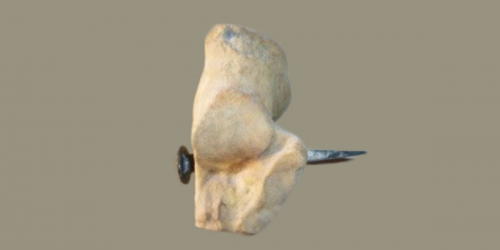
Corinne Duhig reports on ancient and extremely rare crucifixion findings
Lucy DoS Dr Corinne Duhig reports for British Archaeology on only known example of a Roman crucifixion in the British Isles
Recent excavations at Lucy Cavendish are progressing well and all results will be published in the Cambridgeshire Archaeological Journal
Archaeological excavations are currently being undertaken at Lucy Cavendish College, ahead of the construction of its new ‘Passivhaus’ student accommodation development. Works have been progressing well and producing some interesting results. Lucy Cavendish is located just outside the Roman town in Cambridge - an area that was known to have potential for Roman remains following archaeological investigations undertaken many years ago. Findings included cooking pits and a considerable amount of pottery fragments as well as a variety of coins. The line of a Roman road had also been recorded at the eastern end of the College site. Because of this potential for Roman remains, an archaeological desk-based assessment alongside archaeological evaluation trenching was undertaken to support the planning application for the new student accommodation.
Dr Corinne Duhig, Director of Studies in Archaeology, Lucy Cavendish College, said:
"I am not surprised at these finds, but very excited as it contributes to our good but patchy knowledge of the Roman town and everyday life of the time."
Excavations of the footprint of the new development have progressed well and revealed a cobbled surface which is thought to be the line of the Roman road. Various other pots, post holes and ditches have also been found as well as a large quantity of Roman pottery and a metal vessel. X-rays of the vessel have revealed some tantalising detail and it will now be excavated carefully in the lab. Two human inhumation burials have also been found. Romans typically buried their dead beside roads outside of their settlements and so the presence of these burials is not unexpected. They have been excavated with the due care and respect that human burials require and will be studied in the lab to try to gain some understanding of their age, sex and diet.
The excavation works are on-going. A programme of detailed hand excavation and recording has been agreed with Cambridgeshire County Council and will be completed over the next few weeks. Following completion of the excavation, the site records, finds, environmental samples, pottery and other artefacts recovered will be analysed and studied in detail with the results being published in the Cambridgeshire Archaeological Journal in due course.
Read more about Lucy’s new Passivhaus student accommodation here



